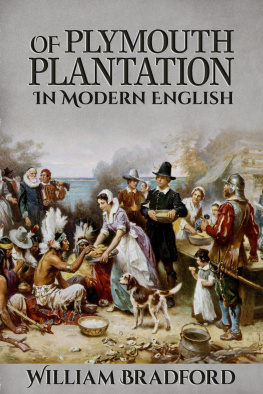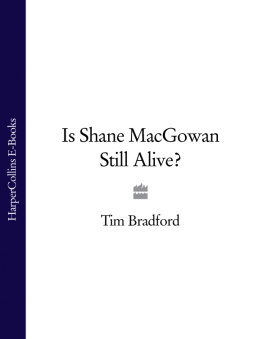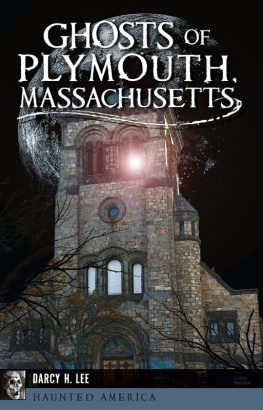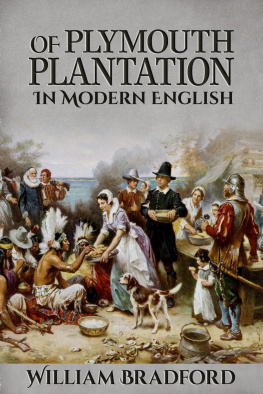Of Plymouth Plantation
By William Bradford
IN MODERN ENGLISH
Of Plymouth Plantation by William Bradford - In Modern English. First published as Bradfords History of the Plymouth Settlement 1608-1650 Rendered into Modern English by Harold Paget in 1920. This edition published 2017 by Enhanced Media. All rights reserved.
ISBN: 978-1-365-69237-6.
BOOK I: 1608-1620
PERSECUTION AND FLIGHT FROM ENGLANDSETTLEMENT IN HOLLAND (AT AMSTERDAM AND LEYDEN)CROSSING TO ENGLAND AND VOYAGE TO AMERICALANDING AT CAPE COD AND NEW PLYMOUTH.
Chapter I
Suppression of Religious Liberty in EnglandFirst Cause of the Foundation of the New Plymouth Settlement.
F irst I will unfold the causes that led to the foundation of the New Plymouth Settlement, and the motives of those concerned in it. In order that I may give an accurate account of the project, I must begin at the very root and rise of it; and this I shall endeavour to do in a plain style and with singular regard to the truth,at least as near as my slender judgment can attain to it.
As is well known, ever since the breaking out of the light of the gospel in England, which was the first country to be thus enlightened after the gross darkness of popery had overspread the Christian world, Satan has maintained various wars against the Saints, from time to time, in different ways,sometimes by bloody death and cruel torment, at other times by imprisonment, banishment, and other wrongs,as if loathe that his kingdom should be overcome, the truth prevail, and the Church of God revert to their ancient purity, and recover their primitive order, liberty and beauty. But when he could not stifle by these means the main truths of the gospel, which began to take rooting in many places, watered by the blood of martyrs and blessed from heaven with a gracious increase, he reverted to his ancient stratagems, used of old against the first Christians. For when, in those days, the bloody and barbarous persecutions of the heathen Emperors could not stop and subvert the course of the gospel, which speedily overspread the then best known parts of the world, he began to sow errors, heresies, and discord amongst the clergy themselves, working upon the pride and ambition and other frailties to which all mortals, and even the Saints themselves in some measure, are subject. Woeful effects followed; not only were there bitter contentions, heart burnings, and schisms, but Satan took advantage of them to foist in a number of vile ceremonies, with many vain canons and decrees, which have been snares to many poor and peaceable souls to this day.
So, in the early days, Christians suffered as much from internal dissension as from persecution by the heathen and their Emperors, true and orthodox Christians being oppressed by the Arians and their heretical accomplices. Socrates bears witness to this in his second book. His words are these: "Indeed, the violence was no less than that practised of old towards the Christians when they were compelled to sacrifice to idols; for many endured various kinds of tormentoften racking and dismemberment of their joints, confiscation of their goods, or banishment from their native soil."
Satan has seemed to follow a like method in these later times, ever since the truth began to spring and spread after the great defection of that man of sin, the Papal Antichrist. Passing by the infinite examples throughout the world as well as in our country, when that old serpent found that he could not prevail by fiery flames and the other cruel torments which he had put in use everywhere in the days of Queen Mary and before, he then went more closely to work, not merely to oppress but to ruin and destroy the kingdom of Christ by more secret and subtle means, and by kindling flames of contention and sowing seeds of strife and bitter enmity amongst the reformed clergy and laity themselves.
Mr. Fox records, that besides those worthy martyrs and confessors who were burned and otherwise tormented in Queen Mary's days, as many as 800 students and others fled out of England, and formed separate congregations at Wesel, Frankfort, Basel, Emden, Marburg, Strasburg, Geneva, etc.
Amongst these bodies of protestant reformersespecially amongst those at Frankfort,arose a bitter war of contention and persecution about the ceremonies and the service book and other such popish and anti-Christian stuff, the plague of England to this day. Such practises are like the high places in Israel, which the prophets cried out against; and the better part of the reformers sought to root them out and utterly abandon them, according to the purity of the gospel; while the other part, under veiled pretenses, sought as stiffly to maintain and defend them, for their own advancement. This appears in the account of these contentions published in 1575a book that deserves to be better known.
The one party of reformers endeavored to establish the right worship of God and the discipline of Christ in the Church according to the simplicity of the gospel and without the mixture of men's inventions, and to be ruled by the laws of God's word dispensed by such officers as Pastors, Teachers, Elders, etc., according to the Scriptures.
The other party,the episcopal,under many pretenses, endeavored to maintain the episcopal dignity after the popish manner,with all its courts, canons, and ceremonies; its livings, revenues, subordinate officers, and other means of upholding their anti-Christian greatness, and of enabling them with lordly and tyrannous power to persecute the poor servants of God. The fight was so bitter, that neither the honor of God, the persecution to which both parties were subjected, nor the mediation of Mr. Calvin and other worthies, could prevail with the episcopal party. They proceeded by all means to disturb the peace of this poor persecuted church of dissenters, even so far as to accuse (very unjustly and ungodly, yet prelate-like) some of its chief members with rebellion and high-treason against the Emperor, and other such crimes.
And this contention did not die with Queen Mary, nor was it left beyond the seas. At her death the episcopal party of the Protestants returned to England under gracious Queen Elizabeth, many of them being preferred to bishoprics and other promotions, according to their aims and desires, with the result that their inveterate hatred towards the holy discipline of Christ in his church, represented by the dissenting part, has continued to this day; furthermore, for fear it should ultimately prevail, all kinds of devices were used to keep it out, incensing the Queen and State against it as a danger to the commonwealth; arguing that it was most needful that the fundamental points of religion should be preached in these ignorant and superstitious times, and that in order to win the weak and ignorant it was necessary to retain various harmless ceremonies; and that though reforms were desirable, this was not the time for them. Many such excuses were put forward to silence the more godly, and to induce them to yield to one ceremony after another, and one corruption after another. By these wiles some were beguiled and others corrupted, till at length they began to persecute all the zealous reformers in the land, unless they would submit to their ceremonies and become slaves to them and their popish trash, which has no ground in the word of God, but is a relic of that man of sin. And the more the light of the gospel grew, the more they urged subjection to these corruptions,so that, notwithstanding all their former pretenses, those whose eyes God had not justly blinded easily saw their purpose. In order the more to cast contempt upon the sincere servants of God, they opprobriously gave them the name of "Puritans," which it is said the novations assumed out of pride. It is lamentable to see the effects which have followed. Religion has been disgraced, the godly grieved, afflicted, persecuted, and many exiled, while others have lost their lives in prisons and other ways; on the other hand, sin has been countenanced, ignorance, profanity, and atheism have increased, and the papists have been encouraged to hope again for a day.















